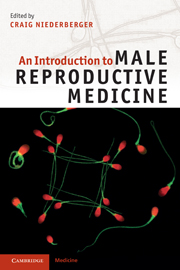Book contents
- An Introduction to Male Reproductive Medicine
- An Introduction to Male Reproductive Medicine
- Copyright page
- Contents
- Contributors
- Preface
- 1 Male reproductive medicine: anatomy and physiology
- 2 Clinical evaluation of the male
- 3 An introduction to male reproductive surgery
- 4 Non-surgical therapy
- 5 Male reproductive immunology
- 6 Genetics of male reproductive medicine
- 7 Semen: analysis and processing
- 8 What to know about the infertile female
- Index
8 - What to know about the infertile female
Published online by Cambridge University Press: 03 May 2011
- An Introduction to Male Reproductive Medicine
- An Introduction to Male Reproductive Medicine
- Copyright page
- Contents
- Contributors
- Preface
- 1 Male reproductive medicine: anatomy and physiology
- 2 Clinical evaluation of the male
- 3 An introduction to male reproductive surgery
- 4 Non-surgical therapy
- 5 Male reproductive immunology
- 6 Genetics of male reproductive medicine
- 7 Semen: analysis and processing
- 8 What to know about the infertile female
- Index
Summary
Keywords
- Type
- Chapter
- Information
- An Introduction to Male Reproductive Medicine , pp. 134 - 151Publisher: Cambridge University PressPrint publication year: 2011



